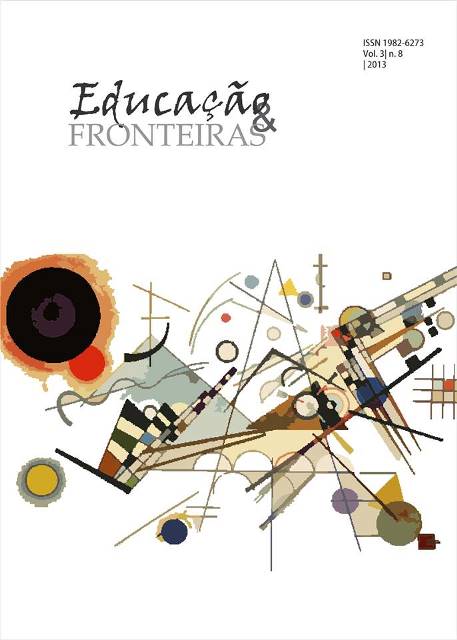Interpretive movement: the weave of literary web between file and memory
Keywords:
Reading. Interpretive movement. Web literary.Abstract
In this article the emphasis is on reading, questioning the idea of the existence of a standardized reading. Accordingly, we discuss the role of the school in the expansion of possibilities of readings and gestures of interpretations by students. We advocate the idea that multiples readings can happens in the school context by circulating various senses, founded on theoretical concepts of pecheutiana Discourse Analysis such as interdiscourse, file and discoursive memory for the construction of concepts such as literary network, the literary web and interpretive movement. Thus, this article presents itself as a scientific research in the field of education, since it aims to analyze how the interpretive movement affects the movement of the author. In our view, the interpretive movement is collective and historicized, but it is also particular to each subject. From this movement, the subject has the possibility to occupy not only the position of the reader, but also the position of the author.Downloads
References
AMADO, Jorge. O Gato Malhado e a Andorinha Sinhá:uma história de amor. São Paulo: Cia das Letrinhas, 2008.
ASSIS, M. O espelho. Rio de Janeiro: Ediouro, 1996.
BAKHTIN, M. Marxismo e filosofia da linguagem. São Paulo: Hucitec, 1992.
BRASIL. Lei de Diretrizes e Bases, 1996.
BRASIL. Lei nº 3.675, 2004.
CARVALHO, D.M. Memórias de leitura e formação inicial de professores.
Iniciação Científica. Faculdade de Filosofia, Ciências e Letras de Ribeirão Preto, Universidade de São Paulo, Pró-Reitoria de Graduação da Universidade de São Paulo, 2011.
COLASANTI, Marina. A moça tecelã. Global editora, 2004.
FERNANDES, C. A. Análise do Discurso: reflexões introdutórias. Goiânia:
Trilhas Urbanas, 2005.
GNERRE, M. Linguagem, escrita e poder. 4ª edição. São Paulo: Martins Fontes, 1998, p. 5-33.
HOLANDA, Salatiel de. Aracne, o eterno tecer. FTD, 1997.
MACHADO, A. M. Como e por que ler os Clássicos Universais desde cedo. Rio de Janeiro: Objetiva, 2002.
MORALES DA SILVA, M. O discurso de universitários em Pedagogia sobre
disciplinas de língua(gem) em sua formação e as implicações para suas futuras práticas pedagógicas. Trabalho de Conclusão de Curso. Faculdade de Filosofia, Ciências e Letras de Ribeirão Preto, PIBIC – CNPq, 2011.
OLIVEIRA, Jô. Tristão e Isolda. Scipione, 2006.
ORLANDI, E.P. A linguagem e seu funcionamento:as formas do discurso. 4ª. ed., Campinas: PONTES, 1996.
ORLANDI, E.P. Análise do discurso:princípios e procedimentos. 6ª. ed.,
Campinas: PONTES, 2005.
PACÍFICO, S.M.R. Os fios significativos da história:leitura e intertextualidade. 1996. Tese (Mestrado). Faculdade de Ciências e Letras Júlio de Mesquita Filho, 1996.
PACÍFICO, S.M.R. Argumentação e autoria:o silenciamento do dizer. 2002. Tese (Doutorado). Faculdade de Filosofia, Ciências e Letras de Ribeirão Preto/USP, Ribeirão Preto, 2002.
PÊCHEUX, M. Semântica e discurso:uma crítica à afirmação do óbvio. (trad. Eni Orlandi et ali) Campinas, SP: Editora da UNICAMP, 1995.
PÊCHEUX, M. O discurso:estrutura ou acontecimento. [trad. Eni P. Orlandi] 2.ed. Campinas, SP: Pontes, 1997.
PÊCHEUX, M. “O papel da memória”. In: ACHARD, P. et al. Papel da
Memória. Pontes, 1999.
PECHÊUX, M. Ler o arquivo hoje. In: ORLANDI, E. P. Gestos de Leitura.
Campinas: Pontes, 2007.
PEREIRA, A. C. Letramento e reificação da escrita. Campinas: Mercado das Letras, 2011.
SHAKESPEARE, William. Romeu e Julieta.L&PM Editores, 1998.
TFOUNI, Leda Verdiani, A escrita: remédio ou veneno? In AZEVEDO,
M.A.&MARQUES, M.L. (orgs.) Alfabetização hoje. São Paulo: Ed. Cortez, p. 51-69, 1994.
______. A dispersão e a deriva na constituição da autoria e suas implicações para uma teoria do letramento. In: SIGNORINI, I. (org.) Investigando a relação oral/escrito e as teorias do letramento. Campinas: Mercado das Letras, 2001/2002.
______. Letramento e Alfabetização. 8ª edição, São Paulo: Cortez, 1995/2006.









